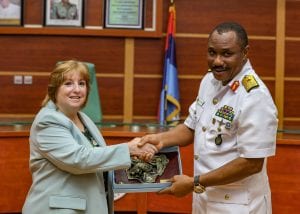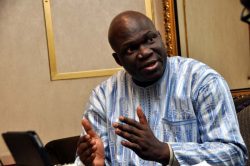U.S. Marine Corps General John M. Paxton, Jr. (rtd.), led a delegation of the United States government on a visit to the Nigerian Defense Headquarters to meet with their Nigerian military counterparts.
Success on the battlefield requires knowledge of military doctrine, the ability to operate in coordination with allied forces, and a global perspective on the part of senior government and military leaders to execute their strategic plans. To achieve these goals, 13 U.S. military flag level officers and two U.S. government senior executives have been visiting Nigeria as part of a two-week tour “Capstone” tour that also took them to Angola, Algeria, Djibouti, and Germany.

The U.S. government’s strategy for Africa focuses on three core objectives:
(1) Advancing trade and commercial ties with key African states;
(2) Protecting the United States from cross-border health and security threats; and
(3) Supporting key African states’ progress toward stability, citizen-responsive governance, and self-reliance.
In pursuit of these objectives, the United States continues its commitment to help African governments, including Nigeria’s, to defend themselves against terrorism. This strategy helps build the capacity of local security forces and institutions to improve their ability to counter terrorism, transnational crime, and illegal trade in narcotics, human trafficking, and natural resources.
Annually, U.S. Capstone participants visit approximately 50 countries during 12 field studies. The Capstone experience enables participants to gain firsthand observations of how U.S. and foreign officials integrate elements of national power to address national and regional threats and opportunities. Cultural events help the fellows gain a greater understanding of the countries visited. This group is one of three cohorts from the same class. The Goldwater-Nichols Department of Defense Reorganization Act of 1986 rendered the Capstone program mandatory.
























Leave a comment